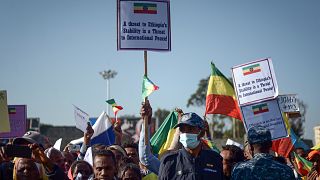Ethiopia
Ethiopia has restored mobile Internet services after the service was blocked over two months. The blockage was connected with anti-government protests that broke out largely in the Amhara and Oromia regions.
Local portals reported that mobile service was restored on Friday evening (December 2) after being shut down since October 04. Ethiopia is currently under a state of emergency with some of the rules being a restriction on access to particular social media platforms. Anti government protests in the country are believed to have been largely instigated via social media.
Social media and messaging platforms such as WhatsApp, Viber and Facebook, and Instagram have still been blocked. Main internet lines were also said to be very slow during the period of the internet shutdown.
It is said that this is the longest sustained mobile internet service shutdown that has taken place in the capital Addis Ababa and across the country.
first tweet from a mobile data in #AddisAbeba, #Ethiopia since Oct. 04; but still via a #VPN. Let's hope it slowly comes to normal!
— Addis Standard (@addisstandard) December 2, 2016
A recent report on access to the internet ranked Ethiopia amongst the worst in the world. In Africa they were ranked along with Gambia, Sudan & Egypt as the worst culprits.
According to the research on the use of the internet, online freedom generally around the world has declined for the sixth consecutive year.
All four African countries considered ‘Not Free’ had internet penetration of between 12 and 36%. Only Sudan did not block social media and other political and social content. But all the others did that and also conducted arrests of bloggers and internet users.
In all, 16 African countries were surveyed by the Freedom House team. The regional spread are as follows:
- Five in North Africa – Egypt, Libya and Tunisia, Sudan, Morocco
- Two in West Africa – The Gambia and Nigeria
- Four in East Africa – Ethiopia, Kenya, Rwanda and Uganda
- Five in Southern Africa – South Africa, Zambia, Zimbabwe, Angola, Malawi.
The report titled ‘Freedom on the Net 2016 – Silencing the Messenger, Communication Apps Under Pressure’ added that two out of every three internet users – 67% – live in countries where online activities are largely censored.
The research was carried out by Freedom House, ‘‘an independent watchdog organization dedicated to the expansion of freedom around the world.’‘ It looked at 65 countries across the world and how they related to the use of the internet.













Go to video
US resumes visas for foreign students but demands access to social media accounts
01:00
US president Trump renews extension for TikTok to avoid nationwide ban
01:52
How a start-up attempts to expose digitally-altered social media content
Go to video
US halts new student visa interviews amid plan to expand social media checks
Go to video
Kenya set to surpass Ethiopia as East Africa’s largest economy in 2025 – IMF
Go to video
Ethiopians mark Easter with calls for peace and love amid ongoing conflict